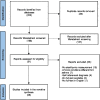Alexithymia and asthma: a systematic review
- PMID: 37609491
- PMCID: PMC10441120
- DOI: 10.3389/fpsyg.2023.1221648
Alexithymia and asthma: a systematic review
Abstract
Growing evidence from scientific research elucidates the important role of alexithymia in chronic immune diseases. This Review aims to explore the presence of alexithymia in patients affected by asthma and clarify its associations with other involved psychological and physical factors. In January 2023, according to PRISMA guidelines, a systematic search using PubMed and Scopus was conducted. Twenty-six studies were eligible based on inclusion criteria. Alexithymia was significantly present in asthma patients, with most studies reporting a higher prevalence (from 9 to 62.8%) than in control groups (approximately 10%). The coexistence of asthma and alexithymia was associated with a worse quality of life, psychiatric comorbidity, poor symptom control, and difficulty in recognizing exacerbations of the disease. These results suggest that alexithymia can negatively impact the management of asthma. For this reason, we recommend an accuracy assessment in clinical settings and the implementation of psychological interventions to promote the emotional and physical wellbeing of asthmatic patients.
Keywords: alexithymia; asthma; chronic disease; clinical psychology; psychological distress; psychosomatic disorders.
Copyright © 2023 Silvestro, Ricciardi, Catalano, Vicario, Tomaiuolo, Pioggia, Squadrito, Schwarz, Gangemi and Martino.
Conflict of interest statement
The authors declare that the research was conducted in the absence of any commercial or financial relationships that could be construed as a potential conflict of interest.
Figures
References
-
- Bach M., Bach D., De Zwaan M., Serim M., Böhmer F. (1996). Validation of the German version of the 20-item Toronto alexithymia scale in normal persons and psychiatric patients. Psychother. Psychosom. Med. Psychol. 46, 23–28. PMID: - PubMed
Publication types
LinkOut - more resources
Full Text Sources


